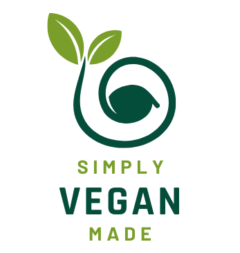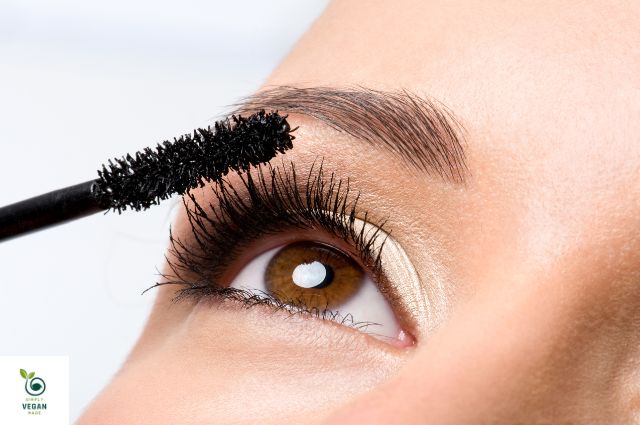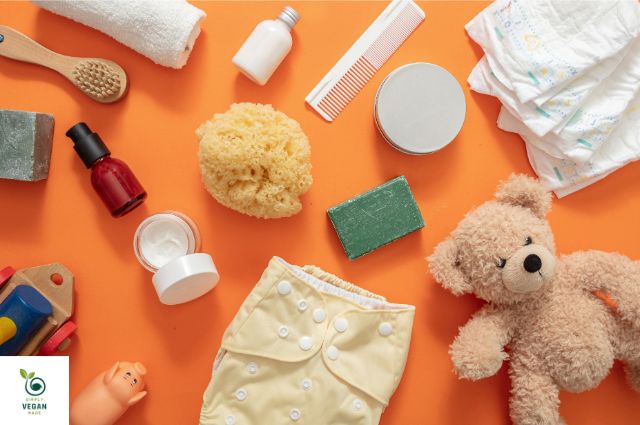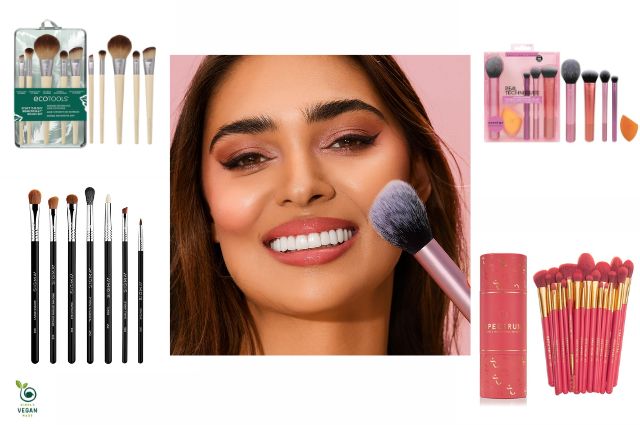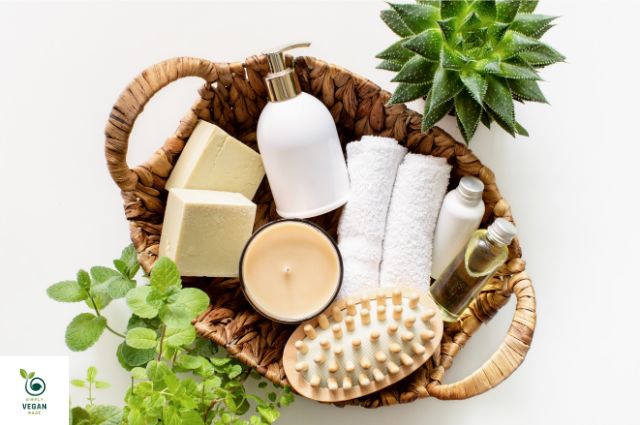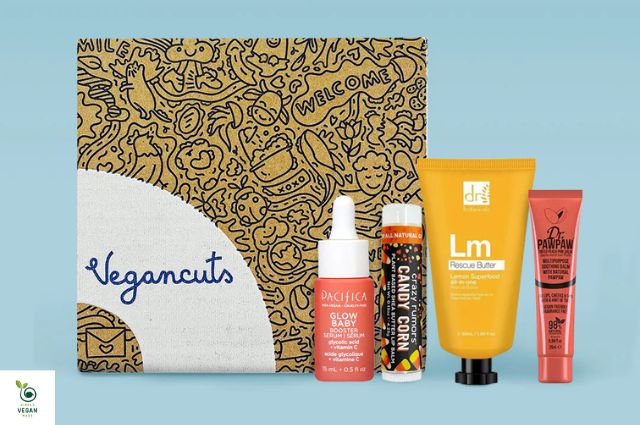Understanding Vegan Mascara Formulations
Vegan mascaras exclude all animal-derived ingredients, replacing traditional components like beeswax, lanolin, and carmine with plant-based choices and synthetic compounds. For those with sensitive eyes, the search for the perfect mascara becomes even more nuanced when adding veganism to the equation.
The key to finding a suitable mascara for sensitive eyes comes from the formulation. While terms like hypoallergenic, fragrance-free, and ophthalmologist-tested are often used, keep in mind that these terms aren’t regulated and their meanings can vary between brands.
Let’s explore what truly matters in a vegan mascara for sensitive eyes.
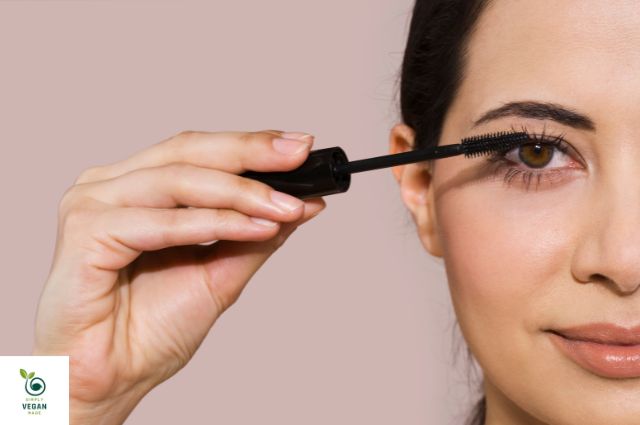
The Building Blocks of Gentle Lash Enhancement
Wax Alternatives
Plant-based waxes like candelilla or carnauba serve as excellent replacements for beeswax. These natural choices provide the necessary structure and hold for your lashes without compromising on vegan principles or eye comfort.
Gentle Pigments
Iron oxides are commonly used in vegan mascaras instead of potentially irritating synthetic dyes. These mineral-based pigments offer rich color without the risk of triggering sensitivities.
Natural Conditioning Agents
Oils such as castor or jojoba play a crucial role in nourishing lashes without causing irritation. These plant-derived ingredients help keep lashes soft and pliable while reducing the risk of brittleness or breakage.
Preservative Systems
Mascaras with minimal, gentle preservatives reduce the risk of adverse reactions. Look for formulas that use natural preservatives or those that have been specifically developed for sensitive skin and eyes.
The Science Behind Sensitivity
Understanding the factors that contribute to eye sensitivity can help in choosing the right mascara. Several elements play a role in determining eye sensitivity:
- Tear film composition
- Meibomian gland function
- Presence of microscopic eyelash mites (Demodex)
Recent studies have shown that regular mascara use can alter meibomian gland morphology, potentially contributing to dry eye symptoms. This finding underscores the importance of choosing a gentle formula and practicing good mascara hygiene.
Navigating the Vegan Mascara Landscape
Now that we’ve covered the basics, let’s explore some innovative approaches in vegan mascara formulations that cater to sensitive eyes.
Tubing Technology: A Game-Changer for Sensitive Eyes
Tubing mascaras have gained popularity among those with sensitive eyes. Unlike traditional mascaras that coat lashes, tubing formulas create tiny, water-resistant ‘tubes’ around each lash.
This technology offers several benefits:
- Reduced Flaking: The tubes stay intact, minimizing the risk of particles falling into the eyes.
- Easy Removal: The tubes slide off with warm water, eliminating the need for harsh makeup removers.
- Minimal Transfer: Less smudging means less chance of irritation throughout the day.
Mineral-Based Formulas: Back to Basics
Mineral mascaras often boast simpler formulations, which can be a boon for sensitive eyes. These mascaras typically use ingredients like iron oxides, zinc oxide, and titanium dioxide to provide color and coverage without synthetic dyes or preservatives.
Lash-Nourishing Ingredients: Beyond Color
Some vegan mascaras incorporate ingredients that enhance lashes visually and nourish them. Look for formulas containing:
- Vitamin E: An antioxidant that protects lashes from environmental damage.
- Panthenol: A form of vitamin B5 that helps strengthen and moisturize lashes.
- Plant-based peptides: These can help stimulate lash growth and improve overall lash health.
The Application Technique: As Important as the Formula
Even the gentlest mascara can cause irritation if applied incorrectly. Here’s a step-by-step guide to applying mascara for sensitive eyes:
- Start with clean lashes and tools.
- Gently wiggle the wand at the base of your lashes.
- Sweep upwards in a zig-zag motion.
- Apply only one or two coats to minimize product buildup.
- Allow each coat to dry before applying the next.
Pro Tip: Consider using a lash primer before mascara. This can create a barrier between your lashes and the mascara, potentially reducing irritation.
Vegan Mascaras Available on Amazon
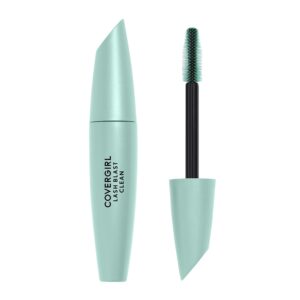
2. ILIA – Limitless Lash Mascara | Non-Toxic, Cruelty-Free
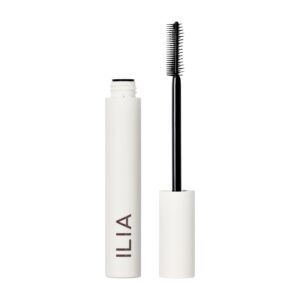
3. essence | Lash Princess Curl & Volume Mascara | Vegan & Cruelty Free
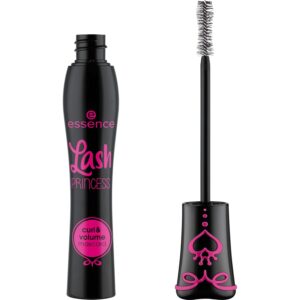
4. essence | Bye Bye Panda Eyes Tubing Mascara
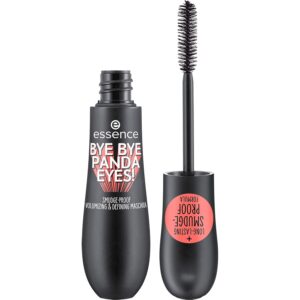
Common Pitfalls and How to Avoid Them
Expired Products
Replace your mascara every 3-6 months to prevent bacterial growth. Using expired mascara increases the risk of eye infections and irritation.
Pumping the Wand
Pumping the mascara wand introduces air and bacteria into the tube. Instead, twist the wand to pick up product.
This method helps maintain the integrity of the formula and reduces the risk of contamination.
Sleeping in Mascara
Always remove your mascara before bed to prevent irritation and potential lash damage. Sleeping with mascara on can lead to clogged pores, eye irritation, and even lash loss over time.
Sharing Mascara
Sharing mascara is a surefire way to transfer bacteria. Keep your mascara to yourself to minimize the risk of eye infections and irritation.
Adapting to Different Scenarios
Different situations may call for adjustments in your mascara routine:
Allergy Seasons
During allergy seasons, opt for a waterproof formula to prevent smudging from watery eyes. Look for vegan waterproof mascaras that are specifically formulated for sensitive eyes to confirm comfort throughout the day.
Swimming
For swimming, choose a water-resistant tubing mascara for better staying power. These formulas are designed to withstand moisture while still being gentle on sensitive eyes.
Dry Climates
In dry climates, look for mascaras with added moisturizing ingredients to combat brittle lashes. Ingredients like hyaluronic acid and glycerin can help keep lashes hydrated and prevent flaking.
From Basics to Mastery: The Journey of Lash Enhancement
As you become more comfortable with vegan mascaras for sensitive eyes, you might want to explore advanced techniques:
Layering
Combining a lengthening mascara with a volumizing one can create dramatic effects. Start with a lengthening formula to extend your lashes, then follow up with a volumizing mascara to add fullness.
Be sure to let each layer dry completely before applying the next to prevent clumping.
Lash Tinting
Consider natural, vegan lash tints for a more permanent color boost. These tints can provide a subtle enhancement to your lashes without the need for daily mascara application.
However, always patch test and ask with a professional before trying any new lash treatments.
Growth Serums
Explore vegan lash growth serums to enhance your natural lashes over time. Look for serums containing ingredients like castor oil, vitamin E, and peptides that can nourish and strengthen lashes.
Be patient, as it can take several weeks to see noticeable results.
Exercises to Refine Your Mascara Skills
The Patch Test Challenge
Before applying any new mascara to your eyes, conduct a patch test on your wrist. Apply a small amount of the product and wait 24 hours to check for any adverse reactions.
This simple step can save you from potential eye irritation and discomfort.
The Removal Race
Time how long it takes to remove different mascaras gently and completely. This exercise will help you identify which formulas are easiest to remove, reducing the risk of irritation from prolonged rubbing or harsh makeup removers.
The Precision Practice
Use a lash comb to separate lashes after applying mascara, improving your application technique. This practice helps prevent clumping and ensures each lash is evenly coated, resulting in a more polished look.
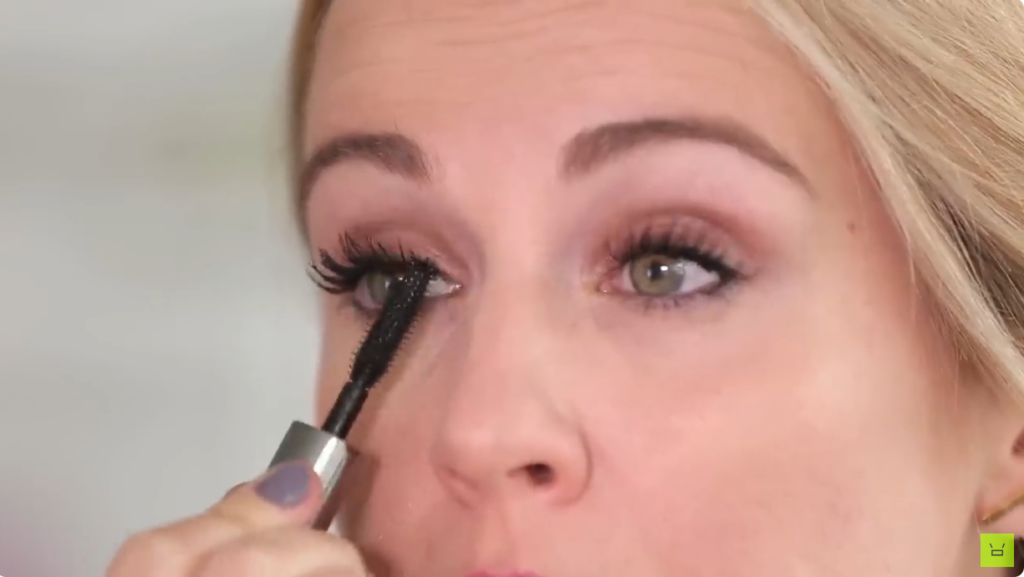
The Role of Diet in Lash Health
While we focus on external products, it’s important to remember that lash health starts from within. A balanced, nutrient-rich diet can contribute to stronger, healthier lashes. Consider incorporating these foods into your diet:
- Biotin-rich foods: Nuts, seeds, and avocados can help strengthen lashes from the inside out.
- Omega-3 fatty acids: Found in flaxseeds, chia seeds, and walnuts, these healthy fats support overall hair health.
- Vitamin E: Almonds, sunflower seeds, and spinach are excellent sources of this antioxidant vitamin.
The Environmental Impact of Vegan Mascaras
Choosing vegan mascaras benefits more than just your lashes and eyes. Many vegan beauty brands prioritize eco-friendly packaging and sustainable production methods.
By opting for these products, you’re contributing to a more environmentally conscious beauty industry.
Some brands use recycled materials for their packaging or offer refillable options to reduce waste. Others focus on sourcing ingredients sustainably, ensuring that their products have a minimal environmental footprint.
The Future of Vegan Mascaras for Sensitive Eyes
The beauty industry is constantly evolving, and the future of vegan mascaras for sensitive eyes looks promising. Researchers are exploring new plant-based ingredients and innovative formulations that could alter the way we think about mascara.
Some exciting developments on the horizon include:
- Customizable formulas: Brands are working on mascara systems that allow users to adjust the formula based on their specific needs and sensitivities.
- Smart packaging: New packaging designs that help prevent contamination and extend the shelf life of mascaras are in development.
- Bioengineered ingredients: Scientists are exploring ways to create vegan choices to traditional mascara ingredients using biotechnology, potentially offering even gentler options for sensitive eyes.
The Psychological Impact of Mascara Use
While we often focus on the physical aspects of mascara application, it’s worth considering the psychological benefits as well. For many people, applying mascara is a form of self-care and a confidence booster.
A study published in the Journal of Cosmetic Science found that wearing makeup, including mascara, can have positive effects on self-esteem and social interactions. For those with sensitive eyes, finding a mascara that works well without causing irritation can be particularly empowering.
The Importance of Proper Mascara Removal
Removing mascara properly is just as crucial as applying it correctly, especially for people who have sensitive eyes. Here are some tips for gentle and effective mascara removal:
- Use a dedicated eye makeup remover: Look for oil-free, fragrance-free formulas specifically designed for sensitive eyes.
- Be gentle: Use soft, lint-free cotton pads or reusable makeup remover cloths to avoid irritating the delicate eye area.
- Take your time: Hold the remover-soaked pad against your lashes for a few seconds before gently wiping away the mascara.
This allows the product to break down, making removal easier.
- Cleanse thoroughly: After removing your mascara, cleanse your face with a gentle, eye-safe cleanser to confirm all traces of makeup are gone.
- Moisturize: Apply a gentle eye cream after cleansing to keep the delicate skin around your eyes hydrated and protected.
The Role of Eyelash Curlers
For those with sensitive eyes, using an eyelash curler can be a great way to enhance your lashes without relying solely on mascara. Here are some tips for using an eyelash curler safely:
- Choose the right curler: Look for curlers with silicone pads, which are gentler on lashes than metal ones.
- Clean your curler regularly: Wipe down your curler with rubbing alcohol after each use to prevent bacteria buildup.
- Be gentle: Apply light pressure when curling your lashes to avoid damaging them or irritating your eyes.
- Curl before applying mascara: This prevents your lashes from sticking to the curler and potentially breaking.
Understanding Mascara Ingredients
To make informed choices about vegan mascaras for sensitive eyes, it’s helpful to understand common ingredients and their functions:
- Emollients: These ingredients help the mascara glide on smoothly.
Vegan options include plant-based oils and silicones.
- Film formers: These create the coating on your lashes.
Look for plant-derived film formers like cellulose or seaweed extract.
- Thickeners: These give mascara it’s texture.
Vegan options include carnauba wax and various plant-derived gums.
- Pigments: These provide color.
Mineral pigments like iron oxides are often used in vegan formulas.
- Preservatives: These prevent bacterial growth.
Look for gentle, naturally-derived preservatives like potassium sorbate or sodium benzoate.
The Impact of Climate on Mascara Performance
Climate can significantly affect how your mascara performs. Here’s how to adapt your mascara routine to different weather conditions:
- Humid climates: Opt for waterproof or water-resistant formulas to prevent smudging and running.
- Dry climates: Look for mascaras with added moisturizing ingredients to prevent lash brittleness.
- Cold climates: Choose a mascara with a flexible formula that won’t flake in cold temperatures.
- Hot climates: Consider using a lash primer to help your mascara stay put in high temperatures.
The Role of Brush Design in Mascara Application
The brush design of your mascara can greatly impact it’s performance and how it interacts with sensitive eyes. Here are some brush types to consider:
- Curved brushes: These help lift and curl lashes, potentially reducing the need for an eyelash curler.
- Thin, straight brushes: These are great for precise application and reaching small lashes in the corners of your eyes.
- Hourglass-shaped brushes: These can add volume and length in one application, minimizing the need for multiple coats.
- Silicone brushes: These are often gentler on lashes and can be easier to clean, reducing the risk of irritation from buildup.
The Importance of Patch Testing
For those with sensitive eyes, patch testing new mascaras is crucial. Here’s a step-by-step guide to conducting a proper patch test:
- Apply a small amount of the mascara to the inside of your wrist or behind your ear.
- Wait 24-48 hours, watching for any signs of irritation such as redness, itching, or swelling.
- If no reaction occurs, apply a small amount to your lash line and wait another 24 hours.
- If still no reaction occurs, it’s likely safe to use the mascara on your lashes.
Remember, even if a product passes a patch test, it’s still possible to develop a reaction over time. Always pay attention to how your eyes feel when using any new product.
The Connection Between Eye Health and Overall Health
Your eye health, including how your eyes react to mascara, can be indicative of your overall health. Certain health conditions can make your eyes more sensitive, including:
- Autoimmune disorders: Conditions like lupus or rheumatoid arthritis can cause dry eyes and increased sensitivity.
- Hormonal changes: Pregnancy, menopause, or thyroid imbalances can affect eye sensitivity.
- Nutritional deficiencies: Lack of certain vitamins and minerals can impact eye health and sensitivity.
If you notice increased eye sensitivity, it’s worth consulting with a healthcare professional to rule out any underlying health issues.
The Role of Sleep in Eye Health and Sensitivity
Getting enough quality sleep is crucial for maintaining eye health and reducing sensitivity. During sleep, your eyes are replenished with essential nutrients and oxygen.
Lack of sleep can lead to:
- Dry, irritated eyes
- Increased sensitivity to light and makeup products
- Reduced tear production
Aim for 7-9 hours of sleep per night to support overall eye health and potentially reduce sensitivity to mascara and other eye makeup products.
The Impact of Screen Time on Eye Sensitivity
In our digital age, increased screen time can contribute to eye sensitivity and discomfort. The blue light emitted by digital devices can cause:
- Eye strain
- Dry eyes
- Blurred vision
These symptoms can make your eyes more sensitive to mascara and other eye makeup products. To mitigate these effects:
- Follow the 20-20-20 rule: Every 20 minutes, look at something 20 feet away for 20 seconds.
- Use blue light filtering glasses or screen protectors.
- Adjust your device’s display settings to reduce blue light emission.
The Importance of Regular Eye Check-ups
Regular eye exams are crucial for maintaining eye health and catching any potential issues early. During these check-ups, your eye doctor can:
- Assess your overall eye health
- Detect any underlying conditions that might be causing increased sensitivity
- Provide personalized recommendations for eye care and makeup use
Aim to have a comprehensive eye exam at least once every two years, or more frequently if you have existing eye conditions or concerns.
Frequently Asked Questions
What ingredients should I avoid in mascara for sensitive eyes?
Common irritants to avoid include fragrances, parabens, formaldehyde-releasing preservatives, and certain dyes. Look for mascaras labeled as hypoallergenic and fragrance-free.
Can vegan mascaras be as effective as non-vegan ones?
Yes, many vegan mascaras perform just as well as their non-vegan counterparts. Advances in cosmetic technology have led to the development of plant-based ingredients that can mimic the effects of traditional mascara components.
How often should I replace my mascara?
It’s recommended to replace your mascara every 3-6 months, even if it hasn’t run out. This helps prevent bacterial growth and reduces the risk of eye infections.
Are natural mascaras better for sensitive eyes?
Not necessarily. While natural ingredients can be gentler, some people may still be sensitive to certain plant-based components.
It’s important to patch test any new product, regardless of whether it’s natural or synthetic.
Can I use waterproof mascara if I have sensitive eyes?
Some people with sensitive eyes may find waterproof mascaras more irritating due to their stronger formulas. However, if you need a long-lasting option, look for gentle, water-resistant formulas specifically designed for sensitive eyes.
How can I prevent mascara from flaking into my eyes?
Choose a high-quality mascara, avoid applying too many coats, and make sure each coat is dry before applying the next. Also, replace your mascara regularly to prevent it from drying out and becoming more prone to flaking.
Is it safe to use lash growth serums with sensitive eyes?
Some lash growth serums can be irritating, especially for people who have sensitive eyes. Look for gentle, vegan formulas and always patch test before use.
Consult with an eye care professional if you have concerns.
Can wearing mascara daily damage my lashes?
When used properly, daily mascara use shouldn’t damage your lashes. However, it’s important to remove your mascara thoroughly each night and give your lashes occasional breaks from makeup.
How can I make my mascara last longer without irritating my eyes?
Use a lash primer before applying mascara, avoid pumping the wand (which introduces air and bacteria), and store your mascara in a cool, dry place. These steps can help extend the life of your mascara without compromising it’s safety for sensitive eyes.
Are there any vitamins or supplements that can help reduce eye sensitivity?
Omega-3 fatty acids, vitamin A, and vitamin E may help support overall eye health. However, always ask with a healthcare professional before starting any new supplement regimen.
Key Takeaways
- Vegan mascaras for sensitive eyes prioritize gentle, plant-based ingredients.
- Tubing formulas and mineral-based options offer unique benefits for sensitive eyes.
- Proper application technique and hygiene are crucial for preventing irritation.
- Regular replacement of mascara is essential for eye health.
- Adapting your mascara choice to different scenarios can optimize comfort and performance.
